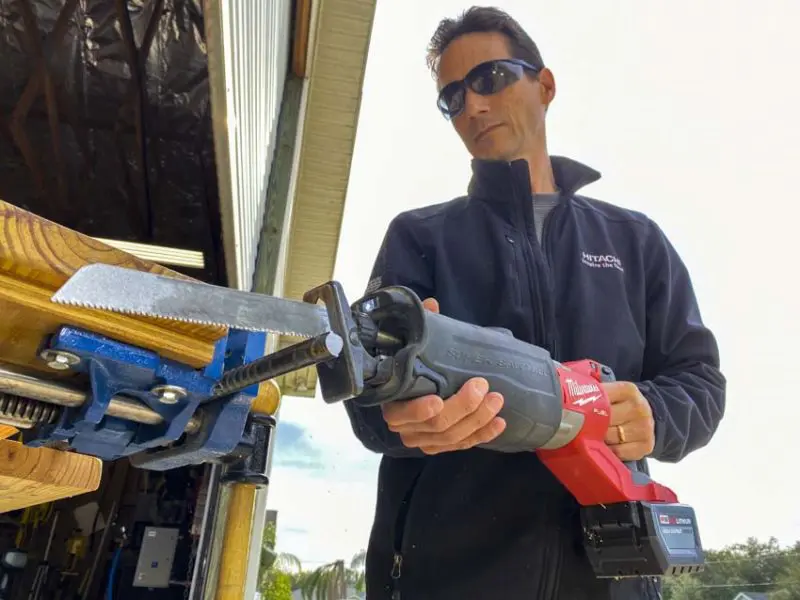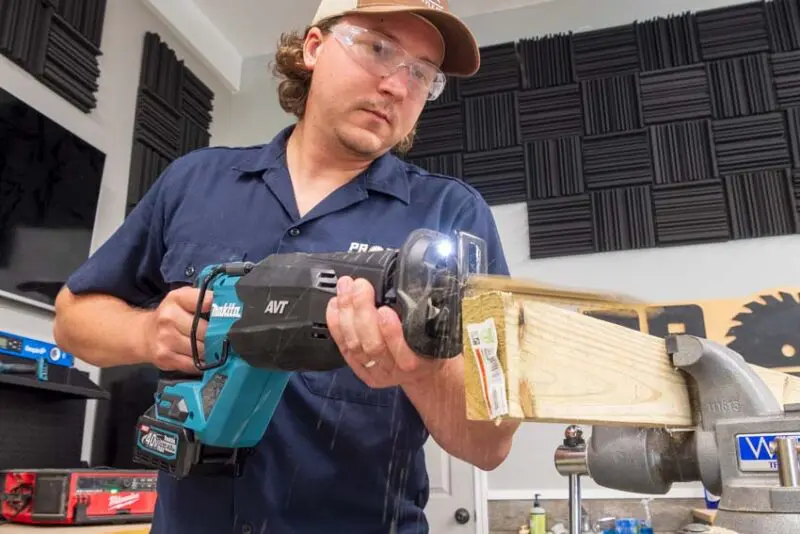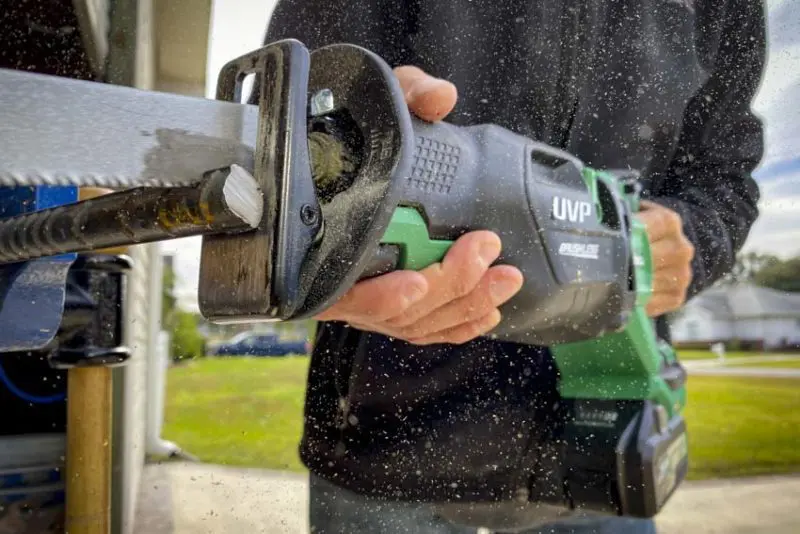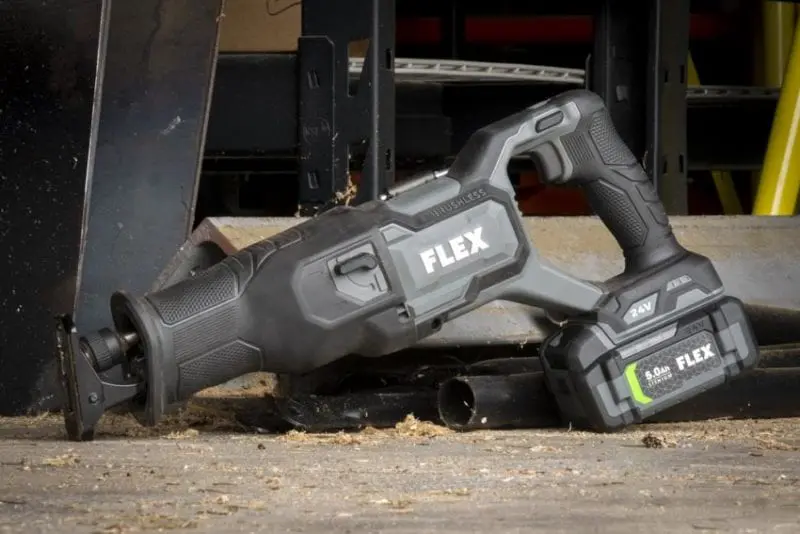After testing dozens of options and weighing them against decades of experience, we’ve narrowed down the absolute best cordless reciprocating saws from manufacturers we trust the most. In this article, we’re focusing on full-size reciprocating saws and Sawzalls. If you’re on the hunt for a compact model, keep your eyes open on our one-hand reciprocating saw comparison for updates.
Not sure where to start? See our Buying Guide to learn about the key brands, performance indicators, and important features to look for!
Our Top Picks
- Fastest Cutting: Milwaukee M18 Fuel Super Sawzall 2722 – Buy at Acme Tools
Jump to this Saw ↓ - Best Vibration Control 1: Makita 40V max XGT Recipro Saw GRJ02 – Buy on Amazon
Jump to this Saw ↓ - Best Vibration Control 2: Metabo HPT 36V MultiVolt CR36DAQ4M – Buy on Amazon
Jump to this Saw ↓ - Best for the Money: Flex 24V Reciprocating Saw FX2271 – Buy on Amazon
Jump to this Saw ↓ - Best DIY/Home Use 1: Skil PWRCore 20 Brushless RS5884-1A – Buy on Amazon
Jump to this Saw ↓ - Best DIY/Home Use 2: Ryobi 18V One+ HP Reciprocating Saw PBLRS01 – Buy at Home Depot
Jump to this Saw ↓
Also In This Article
- Best-Selling Cordless Reciprocating Saws
- More Recommendations
- Best Cordless Reciprocating Saws Buying Guide
- Related Content
- Why You Can Trust Pro Tool Reviews
Fastest Cutting
Milwaukee M18 Fuel Super Sawzall 2722

- Class: Professional
- Motor: Brushless
- Stroke Length: 1 1/4-inch
- Stroke Speed: 0 – 3000 SPM
- Orbital Action: Selectable (2 orbital modes + off)
- Length: 18.9 inches
- Weight: 8.8 pounds bare, 12.3 pounds with a 12.0Ah High Output battery
Milwaukee’s M18 Fuel Super Sawzall has been on the top of our best cordless reciprocating saw list for several years now thanks to its outstanding performance. After seeing some videos showing Makita’s 40V XGT out-cutting it, we put the two head-to-head in a tough cutting scenario of six 3/4-inch stacked and glued OSB sheets cut into a 7-inch block. While Makita had a clear advantage in vibration control, Milwaukee easily outpaced it, finishing the cut in an average of 8 seconds—a 2-second advantage. Combined with our test results in wood, metal, and PVC, this left us with no doubt that Milwaukee is still the leader when it comes to making the fastest cuts.
The downside is that it’s a heavier saw. With the recommended 12.0Ah High Output battery, you have a working weight of 12.3 pounds.
Price: $249 bare, $449 kit with 12.0Ah battery and charger
Best Vibration Control (tie)
Makita 40V max XGT Reciprocating Saw GRJ02

- Class: Professional
- Motor: Brushless
- Stroke Length: 1 1/4-inch
- Stroke Speed: 0 – 3000 SPM
- Orbital Action: Selectable
- Length: 17.8 inches
- Weight: 8.7 pounds bare, 10.9 pounds with a 4.0Ah battery
While Milwaukee showed its higher performance in our tests, Makita proved itself with outstanding vibration control on its GRJ02 from the 40V max XGT line. Once the saw got going, it was tough to bog down, and the way it killed the vibration coming into our hands was downright impressive.
Price: $309 (bare); $529 w/ battery and charger
Metabo HPT 36V MultiVolt Reciprocating Saw CR36DAQ4M

- Class: Professional
- Motor: Brushless
- Stroke Length: 1 1/4-inch
- Stroke Speed: 0 – 3000 SPM
- Orbital Action: Selectable
- Length: 18.0 inches
- Weight: 8.4 pounds bare, 10.7 pounds with a 4.0Ah battery
Metabo HPT put together a design for its MultiVolt reciprocating saw that also has a clear advantage in vibration reduction. Like Makita GRJ02, this 36V model wasn’t as fast as Milwaukee, but its vibration control and lighter weight make it a viable option if you’re willing to trade off some cutting speed.
The other thing Metabo HPT has going for it is that you can run this saw corded using an AC adapter if you like. It’s an unusual feature that doesn’t have much competition in the cordless space at the moment. Plus, there’s a lifetime warranty on this model.
Price: $179 bare
Best For The Money
Flex 24V Reciprocating Saw FX2271

- Class: Professional
- Motor: Brushless
- Stroke Length: 1 1/4-inch
- Stroke Speed: 0 – 3000 SPM
- Orbital Action: Selectable
- Length: 17.5 inches
- Weight: 7.4 pounds bare, 9.5 pounds with a 5.0Ah battery
Flex makes a compelling option for those of you who want professional performance without the premium price tag. The FX2271 includes a 5.0Ah battery and charger for $249. In our tests, the performance lined up with corded models in the 12 – 13-amp class, so don’t expect to cut as fast as the top-tier cordless reciprocating saws that replace 15-amp models.
This has the selectable orbital action we like for making those more aggressive cuts in wood. Plus, it’s under 10 pounds with the 5.0Ah battery that comes in the kit. It’s a solid workhorse saw that’s backed by a lifetime warranty.
Price: $199 (bare); $249 with 5.0Ah battery and charger
Best for DIY and Home Use (tie)
Skil PWRCore 20 Brushless RS5884-1A

- Class: Prosumer
- Motor: Brushless
- Stroke Length: 1 1/8-inch
- Stroke Speed: 0 – 3000 SPM
- Orbital Action: Selectable
- Length: 17.3 inches
- Weight: 6.3 pounds bare, 7.9 pounds with a 5.0Ah battery
Ryobi and Skil attack the Prosumer space from two different angles, both of which are near and dear to the hearts of serious DIYers. Skil offers the lower price of the two while still providing a quality build, brushless motor, and selectable orbital action.
The trade-off is in performance, and Ryobi’s HP Brushless model has an advantage there. But at $149 for a kit that includes a 4.0Ah battery and charger, it’s $60 less. So, if price is your primary concern, Skil is a great option.
Price: $149 with a 4.0Ah battery and charger
Ryobi 18V One+ HP Brushless Reciprocating Saw PBLRS01

- Class: Prosumer
- Motor: Brushless
- Stroke Length: 1 1/4-inch
- Stroke Speed: 0 – 3200 SPM
- Orbital Action: None
- Length: 17.5 inches
- Weight: 5.6 pounds bare, 7.2 pounds with a 4.0Ah High Performance battery
If higher performance is what you’re after, then Ryobi’s 18V One+ HP Brushless reciprocating saw is your best bet in the Prosumer class. Beating out Skil in both stroke rate and length along with the advantage of an advanced high-performance battery, it’s a difference that can shave seconds from each cut.
Ryobi is also a compelling option because the 18V One+ now offers more than 300 products that all work on the same battery.
Price: $129 bare, $209 with 4.0Ah High-Performance battery and charger
Blades for Cordless Reciprocating Saws
CMT Orange Tools

As you’re shopping for reciprocating saw blades, be sure CMT Orange Tools is on your list. Specialists in the tool blade category, their reciprocating saw blade range is exceptional. In addition to the standard wood, metal, and multi-material blades, they also make specialty blades for cutting applications such as rescue, brick, meat and bones, frozen products, and fiber cement. The next time you’re stocking up on recip blades, grab some and try them for yourself!
Best-Selling Cordless Reciprocating Saws
To help you cover all the bases, here’s a look at the cordless reciprocating saws that others are buying at leading retailers.
Acme Tools
- DeWalt Flexvolt 60V Max Cordless Reciprocating Saw Kit DCS389X1 – $339
- Milwaukee M12 FUEL HACKZALL Reciprocating Saw Kit 2520-21XC – $149
- Bosch 12 V Max Pocket Reciprocating Saw Kit PS60-102 – $139
Amazon
- Worx 20V AXIS 2-in-1 Cordless Reciprocating Saw & Jig Saw WX550L – $88.89
- Black+Decker 20V MAX Reciprocating Saw Kit BDCR20C – $69.99
- Milwaukee M18 18V 3,000 RPM Reciprocating Saw 2621-20 – $129
Lowe’s
- Craftsman V20 RP 20V Max Variable Speed Reciprocating Saw CMCS340B – $99
- Kobalt 24V Variable Speed Reciprocating Saw KRS 124B-03 – $79
- DeWalt XR 20V Max Variable Speed Reciprocating Saw DCS382B – $199
Home Depot
- Ridgid 18V Reciprocating Saw Kit R8646KN – $159
- Ryobi ONE+ HP 18V One-Handed Reciprocating Saw PSBRS01B – $119
- Milwaukee M18 FUEL GEN-2 18V SAWZALL Reciprocating Saw 2821-20 – $179
More Recommendations
Not every cordless reciprocating saw we use made it to the top in one of the categories above. There are plenty we still recommend, though. Whether you’re looking for one that’s on the battery system you already have or you want to compare some additional options, here are more recommendations that earn a thumbs up from our team.
Bosch 18V Reciprocating Saw GSA18V-125
- Class: Professional
- Motor: Brushless
- Stroke Length: 1 1/4-inch
- Stroke Speed: 0 – 2500 SPM
- Orbital Action: Selectable
- Length: 19 inches
- Weight: 7.7 pounds bare
On paper, Bosch’s GSA18V-125 is a bit of a sleeper with its 2500 SPM top speed. However, its brushless motor is strong, and it cut much faster in our tests than we initially expected. The vibration control is excellent as well, and it has a variable speed dial for when you need to tone the speed down a bit. Its hawkbill shape is unique for this type of tool, but in our experience, it works well. If you’re on Bosch’s 18V battery system, there’s no need to look at another brand for your demo needs—you’re in great shape with this one.
Price: $299 bare
DeWalt 60V Max FlexVolt Reciprocating Saw DCS389
- Class: Professional
- Motor: Brushless
- Stroke Length: 1 1/8-inch
- Stroke Speed: 0 – 3000 SPM
- Orbital Action: None
- Length: 17.7 inches
- Weight: 7.6 pounds bare, 10.4 pounds with a 3.0Ah battery
DeWalt fans have a couple of good options to choose from with the FlexVolt DCS389 and the FlexVolt Advantage DCS386. The former is the higher performing of the two and has a significant step up in cutting speed compared to the first-generation model.
There are some downsides, though. In our tests, it still has trouble keeping up with its main competitors from Milwaukee and Makita, thanks in part to a lack of orbital action. It would also benefit from an upgrade in vibration control.
Price: $249 bare
Hilti Nuron Reciprocating Saw SR 6-22
- Class: Professional
- Motor: Brushless
- Stroke Length: 1 1/4-inch
- Stroke Speed: 0 – 2600 SPM
- Orbital Action: None
- Length: 18.8 inches
- Weight: 6.8 pounds bare, 8.6 pounds with a 4.0Ah battery
After completing our series of tests, Hilti’s SR 6-22 proved itself to be a solid pick if you’re looking to replace your 12A/13A corded model. While it lacks the orbital action we prefer, it has a dust collection option that’s missing on most reciprocating saws. Helpful on any type of cut, it’s most useful if you’re cutting drywall, cement board, masonry, or other materials that kick up airborne debris. Weighing just 8.6 pounds with a battery, it’s also a good choice if you’re looking for a lightweight Pro-grade build.
Price: ~ $630.95
Kobalt 24V Reciprocating Saw XTR KXRS 124B-03
- Class: Entry-level Professional
- Motor: Brushless
- Stroke Length: 1 1/4-inch
- Stroke Speed: 0 – 3100 SPM
- Orbital Action: Selectable
- Length: 17.1 inches
- Weight: 6.4 pounds bare, 8.0 pounds with a 4.0Ah Ultimate Output battery
Kobalt’s XTR line marked the high-value brand’s entry into the advanced cordless category that combines battery, motor, and electronics technology to get higher performance from power tools. The reciprocating saw posted a solid boost in performance over the last generation while keeping the weight to just 8 pounds with a battery. Plus, it introduces an anti-vibration system and selectable orbital action that the previous brushless model didn’t have and sets it apart among high-value models. Even better, the price is just $20 more than the older one, making the upgrade well worth it.
Price: $149 bare
Ridgid 18V Brushless Reciprocating Saw R8647
- Class: Entry-Level Professional
- Motor: Brushless
- Stroke Length: 1 1/4-inch
- Stroke Speed: 0 – 3200 SPM
- Orbital Action: Selectable
- Length: 17.6 inches
- Weight: 6.8 pounds bare, 8.3 pounds with a 4.0Ah Max Output battery
Compared to its predecessor, Ridgid’s R8647 is nearly half a pound lighter and slightly more compact. At the same time, it increased both its speed and stroke length. It’s not just bigger numbers for the packaging, either. This saw has legitimately excellent cutting speed in wood. The longer stroke length and higher speed can hurt its cutting speed in thick metal, so you’ll want to feather the trigger when you come to those cuts. However, we have no hesitation in recommending Ridgid as a full replacement for your 12A/13A corded saw.
Price: $268 with two 4.0Ah batteries and a charger
Greenworks 24V Brushless Reciprocating Saw
- Class: DIY
- Motor: Brushless
- Stroke Length: 1 1/8-inch
- Stroke Speed: 0 – 2700 SPM
- Orbital Action: None
- Length: 18.3 inches
- Weight: 6.1 pounds bare, 7.8 pounds with a 4.0Ah battery
Greenworks is carving out a niche in the DIY market with its 24V system that covers both lawn care and power tools. With a working weight that’s under 8 pounds, its weight, brushless motor, and easy lever-release blade changes set it apart from other DIY options. Even though it doesn’t have orbital action to kick the performance level up on wood cutting, it’s a comfortable, approachable saw that’s easy to use for both experienced and new DIYers.
Price: $149.99
Masterforce 20V Boost Reciprocating Saw 2410352
- Class: DIY
- Motor: Brushless
- Stroke Length: 1 1/8-inch
- Stroke Speed: 0 – 3100 SPM
- Orbital Action: Selectable
- Length: Not listed
- Weight: 5.9 pounds bare, 6.9 pounds with a 2.5Ah Boost battery
Masterforce is primarily a Prosumer brand sold at Menard’s. In our tests, it outperformed DIY models. This is largely thanks to the brushless motor’s ability to power through cuts and the orbital setting that many DIY saws forgo. The big thing to keep in mind is that to get that Prosumer performance, you need to pair the saw with a Boost battery. Standard Masterforce 20V batteries work, but the Boost packs raise the performance.
Price: $134.79
Best Cordless Reciprocating Saws Buying Guide
Cordless Reciprocating Saw Brands by Class
Professional
- Bosch
- DeWalt
- Festool
- Flex
- Hilti
- Ingersoll Rand
- Makita
- Metabo
- Metabo HPT
- Milwaukee
Prosumer/Entry-Level Professional
- Craftsman
- Kobalt
- Ridgid
- Ryobi
- Skil
What’s Prosumer? Prosumer tools meet the needs of serious DIYers and entry-level Pros. They offer better performance and features than DIY models and a lower price than premium proferssional options.
DIY
- Black and Decker
- Greenworks
- HART
- Masterforce
What to Look for When You’re Shopping
Class: Lets you know what type of user it’s most appropriate for
Motor: A brushless motor offers significantly better performance, longer runtime, and tool life than brushed. The trade-off is a higher price tag. While DIYers can get away with a brushed motor, professionals (and those who want Pro performance) need a brushless motor.
Stroke Length: A longer stroke length means faster material removal. We prefer full-size saws to have 1 1/8-inch to 1 1/4-inch stroke lengths.
Stroke Speed: Measured in strokes per minute, a higher stroke rate offers faster cutting. Full-size saws we recommend range from 2500 to 3200 SPM.
Pro Tip: Stroke speed and length are great numbers to know, but it’s the motor’s ability to keep the stroke rate up that determines how fast you can cut. Some of the DIY and Prosumer saws have specs that match or exceed some of our Pro saws, but they still cut slower head-to-head.
Orbital Action: This feature introduces an elliptical motion to the stroke, increasing the aggressiveness and speed of the cut. We prefer this to be a selectable feature you can turn on or off. It’s usually on professional saws, but something that’s not as common at the Prosumer and DIY levels.
Length: The length of the saw helps you determine how small of a space you can cut in. There’s a direct correlation between the size of the saw and its performance level. Larger motors, vibration control mechanisms, and other components dictate that high-performance cordless reciprocating saws are larger. Typical lengths are 17 to 19 inches for full-size models.
Weight: We want to work with as light of a saw as possible to reduce fatigue. Finding the right balance of weight, performance, and vibration control is key to doing the job efficiently. Professional saws can have a working weight (saw and battery) in the 9 to 12-pound range, while Prosumer and DIY models tend to drop below that.
Additional Features to Consider
Blade Changes: Virtually all modern cordless reciprocating saws now have tool-free blade changes. Models that include a lever release on the outer housing a much easier to change than those with a twist lock directly on the shaft. Spring-loaded active ejection and automatic locking when you insert the blade are also nice features to have.
Vibration Control: Advanced vibration control greatly reduces the amount of fatigue your arms experience while you’re cutting with a cordless reciprocating saw.
Speed Dial: This feature adjusts the maximum speed of the saw when a lower speed is advantageous, especially when cutting hard metals.
Pivoting Shoe: A reciprocating saw shoe’s ability to pivot helps you keep it in contact with the cutting surface on long cuts or round materials. It’s critical to keep the shoe engaged with the material to minimize vibration; a pivoting shoe makes it much easier.
Adjustable Shoe: Having the ability to adjust the length of the shoe allows you to engage unused teeth and get more life from the blade. It’s most helpful when you’re cutting material 1 1/2 inches or less so you can get a full set of unused teeth in play. The best cordless reciprocating saws will have a tool-free adjustment.
Rafter Hook: Having a rafter hook enables you to hang your saw in a variety of places, including rafters. Most models have one, and it’s a must-have feature for professional saws.
Dust Collection: Having the option to connect a dust extractor can reduce the amount of debris that collects around your workspace or becomes airborne. It’s especially helpful when you’re cutting cement board, concrete, and masonry products.
Smart Connectivity: Connecting to an app can add the ability to track your cordless reciprocating saw as part of a larger inventory management program. In some cases, it can open up customizable controls.
What are Cordless Reciprocating Saws Used For?
Reciprocating saws (corded or cordless) are primarily demolition tools. Capable of cutting wood, plastic, metal, and even masonry with the proper blades, it’s an aggressive tool designed to help you remove material quickly.
The very first reciprocating saw was Milwaukee’s Sawzall, which they devised as an electric replacement for hacksaws. With the advent of different blades, it became more versatile. It’s such a force in the industry that even today, many people call all reciprocating saws “Sawzalls”.
Related Content
- Best Reciprocating Saws and Sawzalls
- What is a Reciprocating Saw Used For?
- Sawzall vs. Reciprocating Saw: Are They the Same?
- What to Look for in a Reciprocating Saw
Why You Can Trust Pro Tool Reviews
Ever check out a “review” site and you can’t tell if the author has any real experience with tools or if they’re just “recommending” the Amazon top sellers? That’s not us. We won’t recommend anything unless we’d use it ourselves. It’s all about giving you a legitimate recommendation and our honest opinion of each product.
We’ve been in business since 2008 covering tools, writing reviews, and reporting on industry news in the construction and lawn care industries. Our Pro reviewers work in the trades and have the skills and experience to know whether tools can perform well in the field.
Each year, we bring in and review more than one hundred individual products. Our team will put our hands on hundreds more at media events and trade shows throughout the year.
Pro Tool Reviews consults with innovators in the technology and design of tools to gain a broader grasp of where these products fit and how they work.
We work with more than two dozen professional contractors around the United States who review products for us on real job sites. We consult with them extensively on testing methods, categories, and practical applications.
Our site will provide several hundred pieces of new content this year absolutely free for our readers. That includes objective evaluations of individual tools and products.
The result is information you can trust because of the editorial, scientific, and real-world professional experience we collectively utilize each and every time we pick up and test a tool.



